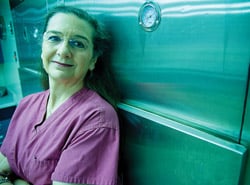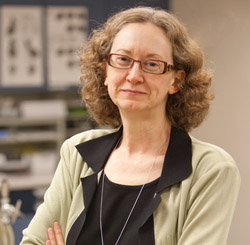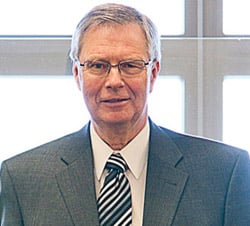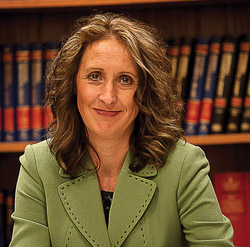CSI Breakdown

Medical Examiner Dr. Lindsey Thomas. (Photos by Jason Wood)
The case against Minnesota high school student Nicole Beecroft two years ago was horrid in itself. Beecroft, then 17, was charged with stabbing her newborn daughter to death after secretly giving birth in the laundry room of her mother’s home.
The case was front-page news and Beecroft was convicted of first-degree murder and sentenced to a life term.
But for Dr. Susan Roe, an assistant medical examiner for eight Minnesota counties, the gruesome details were only a part of what troubled her. “It was an awful, horrible experience,” she says of her involvement in the trial as a medical expert for the defense. “It’s not worth it.”
In retaliation for her testimony in the case, Roe says, prosecutors threatened to file a complaint against her with the state agency that licenses and disciplines doctors and to prevent her from teaching another class at the state crime lab where she has taught regularly for years.
Prosecutors in the case deny that anybody on their side made any threats to Roe in conversations that Roe says took place during a pretrial conference with defense lawyers.
“I have no idea where she got that from,” says Assistant Washington County Attorney Heather Pipenhagen, one of two prosecutors in the case, “but I can assure you that it didn’t happen.”
The fact that Beecroft stabbed her newborn daughter was not in dispute. The central issue in the case was whether the child was alive when she did.
The prosecution’s medical experts concluded that the baby had lived long enough for air to have entered her lungs and died as a result of the stab wounds. But the defense contended that the baby was stillborn and that Beecroft, therefore, couldn’t be guilty of murder because the child was never alive.
Roe, ironically, was probably the defense’s weakest medical witness. Three other defense experts —including two other county medical examiners in Minnesota —had concluded that the baby was stillborn. Roe, a well-regarded expert in infant deaths, considered the evidence inconclusive.
“It was a really tough call,” she says.
During the Beecroft trial, Dakota County Attorney James Backstrom—head prosecutor in one of the eight counties for which Roe works—admitted sending an e-mail to Dr. Lindsey Thomas, Roe’s boss at the Minnesota Regional Medical Examin er’s Office in Hastings. Backstrom told Thomas she could lose her county job if she or her assistants continued to do defense work against his wishes and the county sheriff’s wishes.
The e-mail so unnerved her, Roe says, that she abruptly withdrew from the case, hired a lawyer and left the state until the trial was over.
“Both [Thomas] and I viewed it,” Roe says, “as a legitimate threat to our livelihood.”

Assistant Medical Examiner Dr. Susan Roe
To many medical examiners, the Beecroft case and Roe’s trepidation sound familiar. They say they’ve been called names behind their backs and had their professional reputations besmirched. They say they have been subjected to intimidation tactics—subtle and overt—and threatened with the loss of their appointed public positions. Their tormenters, they say, are police and prosecutors who criticize them for doing consulting work for the defense.
The episode helped expose a deep—and apparently long-standing—philosophical rift between some prosecutors and law enforcement officials, on the one side, and much of the forensic science community on the other.
Some police and prosecutors tend to view government-employed forensic scientists, including medical examiners, not as independent experts but as members of the prosecution’s “team.” Medical examiners, for the most part, view themselves first and foremost as scientists, beholden not to one side or the other but only to the truth.
Incidents like this are the reason the National Association of Medical Examiners has a standard that calls for death investigations to be conducted independently of law enforcement officials and prosecutors. Such a policy, it says, “promotes neutral and objective medical assessment of the cause and manner of death.”
It’s enough of a problem that the National Academy of Sciences also saw fit to address the issue in its wide-ranging report last year on deficiencies in the nation’s forensic science and medical examiner system. The 352-page report, commissioned by Congress in 2005, offers a detailed assessment of the existing system’s shortcomings, as well as a blueprint for future improvements.
One of the problems cited by the report is a lack of independence between many forensic scientists and the law enforcement community. The academy recommends that sufficient funding be provided to remove all public forensic laboratories and facilities from the adminis trative control of law enforcement agencies or prosecutors’ offices.
“The best science is conducted in a scientific setting as opposed to a law enforcement setting,” it says.
Another problem identified in the report is the hodgepodge of existing state and local death investigation systems, which the report says makes standardization of practices and procedures difficult if not impossible to achieve. The report recommends that Congress appropriate the necessary funds to replace the nation’s 1,600 existing coroner systems with regional medical examiner offices.
The report also addresses the wide disparity in the quality of existing forensic science operations. The academy recommends that all forensic science labs be accredited and that all forensic scientists be subject to rigorous certification standards. It also recommends that all autopsies be performed or supervised by a board-certified forensic pathologist, a doctor specially trained in determining the cause and manner of death.
There’s a practical reason for allowing medical examiners to consult for the defense too, as the report notes and many medical examiners are quick to point out. There are only a few hundred board-certified forensic pathologists practicing in the entire country. And if every one of them who works as a medical examiner in one capacity or another were barred from working for the defense, there wouldn’t be enough of them left to go around.
Such disputes have occasionally surfaced publicly over the years. And not just in Minnesota.
Back in 1994, a Mississippi prosecutor wrote a letter to the state public safety commissioner to complain about the state medical examiner at the time, whom the prosecutor said had “unnecessarily rendered aid to the defense of criminal defendants” in at least two cases he knew of.
In the letter, the prosecutor—who went on to serve one term as a circuit court judge and now operates a private civil practice in Jackson—said that the medical examiner needed to “be mindful” of who she worked for, and that a prosecutor shouldn’t have to “bear the extra burden of wondering” whose side employed her.
“The state medical examiner should not confer with the defense at all, except when under subpoena in open court; or upon the consent of the commissioner and the district attorney,” he wrote.
In response, according to news accounts at the time, the public safety commissioner sent the state medical examiner a memo essentially agreeing with the pros ecutor’s position. She resigned in 1995 after the state’s coroners started circulating a petition calling for her removal. The office apparently remains vacant to this day.
It all sounds terribly familiar to Dr. Gregory Schmunk—now the chief medical examiner in Des Moines, Iowa, and secretary-treasurer of the National Association of Medical Examiners—who found himself in a similar situation when he served as the county medical examiner in Green Bay, Wis., in the late ’90s.

Washington County Attorney Doug Johnson
At the time, several area counties were exploring a plan that proposed creating a regional medical examiner’s office that he would head, Schmunk says.
But one county prosecutor who later went to prison for witness tampering refused to consider the plan because Schmunk had done consulting work for the defense in cases from surrounding counties outside of his jurisdiction, including the prosecutor’s.
The dispute became big news in the Green Bay area, the plans for a regional office were dropped, and Schmunk eventually moved on to greener pastures elsewhere.
Schmunk says he would like to think that most prosecutors appreciate the value in having a medical expert who is both independent and impartial available to each side. But he knows that’s not always the case.
“Some prosecutors just don’t get it,” he says.
Neither, apparently, do some local TV stations.
Last year, Georgia’s chief state medical examiner, Dr. Kris Sperry, found himself under public scrutiny after the Fox affiliate in Atlanta broadcast a two-part “investigation” into his occasional defense work in other states.
Sperry says the issue doesn’t come up very often. But when it does, it tends to make a big splash.
Sperry’s boss, Georgia Bureau of Investigation Director Vernon Keenan, told the TV station he’d “look into” the situation. But Sperry says Keenan, who is also a friend, only counseled him to “be careful” not to testify as a retained expert for the defense in a case within his jurisdiction.
“It was a pain in the butt,” Sperry says of the publicity, though “it didn’t affect what I do or how I do it.”
The Minnesota case revealed much of the conflict. After the trial, the state public defender’s office filed a complaint against Backstrom with the state’s Office of Lawyers Professional Responsibility, which found that the prosecutor had violated a rule prohibiting lawyers from engaging in conduct prejudicial to the administration of justice. It recommended a public reprimand and a $900 fine, which the Minnesota Supreme Court, in a one-page order, approved in June 2009.
Beecroft is appealing her conviction and sentence based in part on claims that behind-the-scenes meddling by prosecutors denied her a fair trial.
Some prosecutors, including Doug Johnson—the Washington County, Minn., county attorney whose office prosecuted Beecroft —apparently don’t have a problem with government-employed medical examiners testifying as defense experts, as long as they testify truthfully.
They realize that the system depends on both the prosecution and the defense having access to qualified experts whose work will be able to withstand peer review. And they recognize that a scientist who testifies exclusively for one side or the other would be susceptible to impeachment as a hired gun.
Josh Marquis, who has spent more than 25 years as a prosecutor, the last 16 as the Clatsop County, Ore., district attorney, says he’s OK with the practice—up to a point. “That’s part of their job,” he says.
Then again, Marquis hasn’t tried a murder case in his county in eight years. And the last time he did, the two co-defendants were convicted of manslaughter despite testimony on their behalf by both the state medical examiner and her predecessor.
Marquis concedes that he might have a problem with the practice if it happened more often. “There’s a big difference between having a difference of opinion in one case and becoming an advocate for the other side,” he says.
But others aren’t so sure.
Scott Burns, who spent 16 years as a prosecutor in Utah before becoming executive director of the National District Attorneys Association in 2009, says he’s never heard of a government-employed medical examiner working as a defense expert on the side. And he admits that the idea is one that rubs him the wrong way.
“I think it raises questions about their credibility and the validity of their opinions,” he says.
Burns polled more than a dozen of his former colleagues on the issue at a national gathering of district attorneys recently. And the results were mixed. He says that some, particularly those from small, rural jurisdictions where medical examiners aren’t well-paid or working for the government full time, don’t seem to have a problem with the practice. Others, primarily from large, urban jurisdictions where being a medical examiner is a well-paying, full-time job, tended to share his reservations about it.
Backstrom, for his part, refused to discuss his feelings on the matter, citing Beecroft’s pending appeal among his reasons. He referred to a prepared statement he released at the time the disciplinary case against him was made public in which he apologized for what he said was a “lack of judgment.”

Assistant Washington County Attorney Heather Pipenhagen
But he detailed his objections to the practice in his e-mail to Thomas, saying he viewed it as a conflict of interest that could be detrimental to the prosecution of not only a colleague’s case but also other future cases prosecuted by his office.
“You are under no obligation to accept requests to testify as a defense expert—there are many other forensic experts out there who do not have the added credibility of being a sitting medical examiner in another jurisdiction who can assist in the criminal defense of persons charged with a crime,” he wrote. “Refer these requests to them.”
Backstrom has a history of this sort of thing going back a decade or more, according to former Dakota County coroner Dr. John Plunkett, who once had the job now held by Thomas.
Plunkett says Backstrom issued a threat to him in the late 1990s after Plunkett testified as a defense expert in three child abuse cases Backstrom had prosecuted in which the defendants were all acquitted. Plunkett says he agreed not to testify for the defense anymore in Dakota County because he “needed the job,” but he eventually quit when Backstrom started badgering him not to testify for the defense anywhere in the state.
“His attitude was basically, if you testify for the defense, you’re out on the street,” says Plunkett, now a consulting forensic pathologist in private practice.
Backstrom also had a previous run-in with Thomas when he heard—erroneously—that Roe might be pre paring to testify as a defense expert in a child suffocation case in another part of the state a few months before Bee croft’s trial. He said then that medical examiners who testify as defense experts put prosecutors in a “difficult position,” even when that testimony is given in other states.
Backstrom evidently isn’t the only Minne sota prosecutor who thinks government-employed medical examiners should refrain from serving as defense experts. Another county medical examiner who also worked as a defense consultant in the Beecroft case was contractually barred from testifying for the defense anywhere in the state at the time of the trial. But that restriction was lifted in the wake of the disciplinary proceeding against Backstrom. Other county medical examiners in Minnesota, including Thomas, have agreed not to testify for the defense in their own jurisdictions to keep the peace with prosecutors.
Backstrom apparently had second thoughts about the e-mail to Roe’s boss, Thomas, after Roe pulled out of the case. He sent out a second e-mail to Thomas—with copies to the judge, defense lawyers and Roe—in which he tried to explain that he was only objecting to the practice as a policy, and hadn’t meant to affect Roe’s involvement in the ongoing trial in any way.
But the damage had already been done. The defense—which had hired Roe to sit through the testimony of the state’s medical experts, suggest possible lines of cross-examination and perhaps testify as a rebuttal witness—had to go it alone.
Christine Funk, one of Beecroft’s two public defenders, says she doesn’t know whether having Roe present for the remainder of the trial would have changed the outcome.
“But it would have made us better advocates,” she says.
Johnson, the Washington County attorney, says he didn’t know about Backstrom’s e-mail to Thomas until after it had been sent. He also thinks it was a mistake for Backstrom to have sent it.
But Johnson says he doesn’t think the e-mail had anything to do with Roe’s decision to withdraw from the case. He thinks she pulled out because she realized that prosecutors were going to crucify her about the apparent inconsistencies between her findings in the Beecroft case and those in four similar cases in which she had previously testified.
“We were prepared to rip her apart on cross,” he says, “and she knew it.”
Johnson also says he thinks the whole controversy over Back strom’s e-mails is a red herring generated by the defense to deflect attention from its own failings in the case.
He says defense lawyers never volunteered the information that prosecutors had offered to let Beecroft enter a plea to second-degree murder and be out of prison by the time she is in her early 30s.
“They turned that down and decided to roll the dice and now she’s serving a [mandatory] life sentence in prison with no possibility of parole,” he says. “Is that justice? I don’t think so.”
Funk confirms that an offer was made, but says Johnson has misstated the terms of the offer, which contained no guarantee that Beecroft would be released by the time she reached her early 30s.
She also says the offer would have included more prison time than the sentences given to any of the eight other Minnesota women accused of killing their newborn children in the previous 15 years.
But Funk insists that Beecroft’s conviction had “nothing to do” with the filing of the disciplinary complaint against Backstrom.
“That’s ridiculous,” she says.



